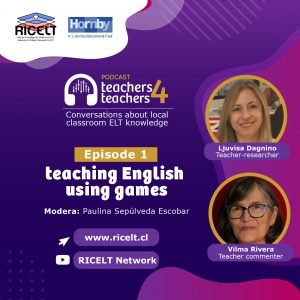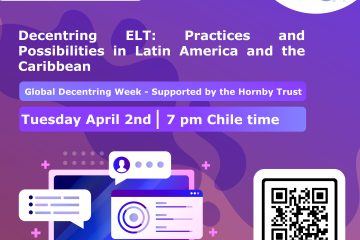7th RICELT Newsletter
Published by admin on
7th RICELT Newsletter
Hello RICELT friends
We hope that this finds you all well.
In this newsletter, you will find our latest additions to our RICELT archive since our last newsletter. Click here to visit our website to get full access to our archive.
You will also be able to easily access all of our Teacher4Teachers episodes, with one remaining to go!
Please continue collaborating with RICELT by keeping us posted about your latest publications, presentations, and theses to be added to our archive. Send us an e-mail to redicelt@gmail.com, or a PM on Facebook or Twitter.
Teachers4Teachers Podcast
| We have so far launched six episodes of the #Teachers4Teachers podcast and you can access them all on Spotify! Subscribe and receive an alert when the next episode is out! If you have missed them, it’s never too late to listen to them all! Go to Spotify now! |
Latest additions to our publication archive
Since our last newsletter, back in January 2022, we have added 29 publications to our archive.
Are we missing something? Let us know by sending us an e-mail at redicelt@gmail.com, or a PM on Facebook or Twitter. We are particularly interested in undergraduate, master and PhD theses.
Check the full list here (338 items and counting!).
Anabalon Schaaf, R. (2022). The pedagogy of love: a register of precarised English teachers in Chile. International Journal of the Sociology of Language, 2022(276), 15-39. https://doi.org/10.1515/ijsl-
2021-0095 Arellano, R. & Nanetti, V. (2021). How to teach (applied) linguistics from the EFL teacher trainee’s perspective. English Language Teacher Education and Development journal (ELTED), 24, 72-80. http://www.elted.net/uploads/
7/3/1/6/7316005/0_article_6_ arellano___nanetti_2021.docx__ 1_.pdf Arellano, R. (2022). Errores orales producidos por profesores de inglés chilenos en formación ¿qué esperar de su competencia lingüística? Actas de la V Jornada de Jóvenes Lingüistas (pp. 1-10). Argentina: Universidad de Buenos Aires. http://eventosacademicos.filo.
uba.ar/index.php/JLL/VJJL/ paper/viewFile/6644/3970 Arias-Contreras, C. (2022). Teaching Language and Content in Chilean Vocational Education Training (VET) Schools: Exploring the Perspectives of Industry Professionals and EFL Teachers. In Christison, A., Crandall, J, and Christian, D. (Eds.) Research on Integrating Language and Content in Diverse Contexts (pp. 110-125). Routledge.
Astorga, E., & Bahamondes, P. (2021). Grammaring, its effects on oral performance among EFL beginner-level learners in Higher Education. Canadian Center of Science and Education, 14 (10), 130 – 142. DOI: https://doi.org/10.5539/elt.v14n10p130 Barahona, M. & Ibaceta-Quijanes, X. (2022). Chilean EFL student teachers and social justice: ambiguity and uncertainties in understanding their professional pedagogical responsibility, Teachers and Teaching, DOI: 10.1080/13540602.2022.2062726
Barahona, M. & Toledo-Sandoval, F. (2022) Exploring Chilean EFL Student Teachers’ Development of Teacher Identity Through Perezhivanie, Journal of Language, Identity & Education, DOI: 10.1080/15348458.2022.2075875
Baker, T., Montoya, K., Odu, P. and Villegas, C. (2021). Collaborative Development and Testing of a Textbook Evaluation Instrument. WAESOL Educator. 47(1). https://waesol.org/wp-content/
uploads/2022/01/Collaborative- Development-and-Testing-of-a- Textbook-Evaluation- Instrument-by-Thomas-Baker- Kathy-Montoya-Paddy-Odu- Carola-Villegas.pdf Carabantes, L. and Paran, A. (2022). ‘It may also be our own fault to think so, to limit them before even trying’: Assuming Learner Limitations during Materials Design in English Language Teacher Education. TESOL J. https://doi.org/10.1002/tesq.
3102 Carabantes, L. and Paran, A. (2022), “I Preferred to Take Another Activity From the Textbook”: An Activity–Theoretical Study of Learning to Design Language Teaching Materials. The Modern Language Journal. https://doi.org/10.1111/modl.
12803 Cárdenas-Claros, M. & P. Dassonvalle, K. (2022). A first step to task design in computer-based L2 listening: Task characteristics elicitation. In Colpaert & Stockwell (eds). Smart CALL. (pp. 266-292) Castletown publications.
Cárdenas-Claros, M (2022). Computer-based L2 listening. In Coombe & Mohebbi (Eds). Research Questions in Language Education and Applied Linguistics. (pp. 615-620). Springer: Berlin
Cárdenas-Claros, M, Campos-Ibaceta, A. &, Vera, J. (2021). Listeners’ patterns of interaction with help options: towards empirically-based pedagogy. Language Learning & Technology. 25(2), 111-134
Jaramillo-Yanquepe, C. (2022). A synthesis of EFL research in Chilean high schools: Research shortage or research opportunities? Profile: Issues in Teachers’ Professional Development, 24 (1), 227–246. https://doi.org/10.15446/
profile.v24n1.9215 Lizasoain, A. (2021). Perfil del profesor de inglés en Chile: quién es y qué enseña. Educar, 57(1), 0189-205.https://doi.org/10.
5565/rev/educar.1150 Martínez, C. B., & Zurita, M. J. M. (2020). Improving Intelligibility and Pronunciation Through Phonics Instruction for 5th Grade EFL Learners of Chilean Public Schools. Sino-US English Teaching, 17(2), 43-57. doi:10.17265/1539-8072/2020.
02.001 Moraru, M. (2022). El reconocimiento como profesor de inglés: una exploración de las experiencias de estudiantes en práctica intermedia. Pensamiento Educativo, Revista De Investigación Latinoamericana (PEL), 59(1). https://doi.org/10.7764/PEL.
59.1.2022.5 (Original work published 28 de abril de 2022) Morrison, A., & Sepulveda-Escobar, P. (2022). Chilean English as a Foreign Language Teacher Educators’ Conceptions and Practices of Online Assessment. RELC Journal. https://doi.org/10.1177/
00336882221079059 Poblete, J. L. (2015). Review of Clear Speech: Pronunciation and listening comprehension in North American English by Judy Gilbert. Journal of the International Phonetic Association, 45(3), 313–314. http://doi.org/10.1017/
S0025100315000201 Poblete, J. L., Gunn, N., & González, X. (2017). The perception of accent in nonnative speakers of English: A case of identity. Revista Akadèmeia, 16(2), 101–127. https://revistas.ugm.cl/index.
php/rakad/article/view/158/163 Rodríguez Clavero, R. (2022). The Sociocultural Factors Influencing Chilean EFL Teachers to Sit for Language Proficiency Examinations. Cambridge Open Engage. https://doi.org/10.33774/coe-
2022-jxlpl Romero, G. (2022). The Neoliberal Blow to English Language Teaching: Deconstructing the Teacher Academy Program in Chile. In: Jalalian Daghigh, A., Mohd Jan, J., Kaur, S. (eds) Neoliberalization of English Language Policy in the Global South. Language Policy, vol 29. Springer, Cham. https://doi.org/10.1007/978-3-
030-92353-2_2 Romero, G. (2022). School and social educational vulnerability in Chile: experiences and preparedness of novice teachers of English. Teachers and Teaching. DOI: 10.1080/13540602.2022.2062718
Rosas, C. (2022). Teaching Didactic Academic Writing in the EFL Context. Academia Letters, Article 5112. https://www.academia.edu/
76876952/Teaching_Didactic_ Academic_Writing_in_the_EFL_ Context Sepulveda-Escobar P. (2020). Bringing to Light English Language Teachers’ Voices for Continuous Professional Learning in Chile. In: Troudi S. (eds) Critical Issues in Teaching English and Language Education. Palgrave Macmillan, Cham. https://doi.org/10.1007/978-3-
030-53297-0_10 Sepulveda-Escobar, P. (2022). ESOL teacher educators’ learning initiatives and perceived learning needs: still a pending task. Journal of Education for Teaching. DOI: 10.1080/02607476.2022.2038517
Singer, N., Poblete, J. L., & Velozo, C. (2021). Design, implementation and evaluation of a data-driven learning didactic unit based on an online series corpus. Literatura y Lingüística, 43, 391–420. https://doi.org/10.29344/
0717621x.43.2785 Tagle Ochoa, T., Etchegaray Pezo, P., Díaz Larenas, C., Alarcón Hernández, P., & Ortiz Navarrete, M. (2022). Representaciones metafóricas sobre la evaluación en el aprendizaje y la enseñanza del inglés que poseen estudiantes de pedagogía y profesores noveles chilenos. Pensamiento Educativo, Revista De Investigación Latinoamericana (PEL), 59(2). https://doi.org/10.7764/PEL.
59.2.2022.12 Yilorm Barrientos, Y., Martínez, E., Silva Dominguez, B., & Alarcón, N. (2022). Movimiento corporal y aprendizaje del inglés: Significados afectivos de los infantes. Revista ProPulsión, 4(1), 123–140. https://doi.org/10.53645/
revprop.v4i1.81










